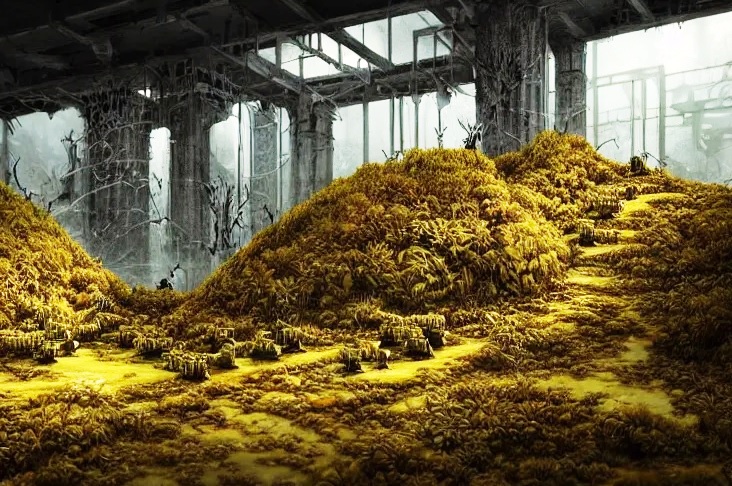Slime Moulds (sage study)
Slime Moulds is a sage study in the field of Animal Life, delving into a diverse assembly of monstrous entities and organisms. Through observation and research, the player character is granted a rich understanding of their ecosystems and natures, edpecially in telling one from another.
Slime moulds are but one of three primary groups, but all are accounted for in the study:
- Slimes and moulds: these life forms exhibit a remarkable tendency to spread outwards like a growing thing, progressively expanding across various surfaces such as floors, walls, and even ceilings. Their preferred habitats predominantly lie beneath the earth's surface, typically in subterranean realms. Examples include brown and yellow mould, gas spores and green slime.
- Metamorphs: these are diminutive creatures adept at transforming themselves into coherent forms or appendages, a skill they utilize both for offensive actions and the consumption of prey. Their agility and adaptability enable them to change their shape to surprise and seize their quarry. Examples include the mimic and yellow pool.
- Puddings, oozes and jellies: the most prolific group, these entities maintain their bodies in a perpetually malleable state, spanning a spectrum that extends from semi-liquid to gelatinous. Their predatory strategy centers on the production of potent enzymes and corrosive acids, which serve to dissolve and assimilate the flesh and various materials of their chosen targets, among other detrimental effects. Examples include black and white puddings, ochre jellies, grey ooze, gelatinous cube and the stunjelly.
Many of these creatures exist due to humanoid actions, being accidentally or deliberately created in laboratories and thereafter proliferating. One encouragement has been the dust that's created through the extraction of ore; this represents a valuable source of sustenance for many of these creatures, much like a natural offal. Occasionally, when a mine has been sealed and untouched for approximately half a century, the resultant populations of these things act like a flood on the surrounding wilderness when the mine is opened.
Slime moulds have no intelligence, existing in a constant search for nourishment, persisting until everything in their environment has been consumed. They tend to reproduce through fission, splitting apart into two, four or eight smaller versions of themselves. Some examples have been estimated to have lived for more than a millennia.
Sage Abilities
The sage abilities below are those acquired by a character through the study, according to status.
Amateur Status
- Detect Slime: improves forewarning through scent recognition of puddings, oozes and jellies before they approach.
- Identify Slime: allows distinction between different forms (jelly, ooze, slime, etc.) and species, enabling knowledge of the danger presented.
Authority Status
- Slag Farmer: collect materials from areas of subterranean construction to create an odourous lure that attracts moving slime.
- Slime Scholar: provides complete details surrounding methods of attack and vulnerabilities of slime moulds and other like creatures.
- Detect Metamorph: upon coming within 60 ft. of a metamorph, the character is able to recognise that its presence with a 3 in 6 chance.
Expert Status
- Muck Receptacle: create a transparent material that can be fabricated into jars and cages to contain slime moulds and other creatures for experimentation and safety.
- Pudding Alchemist: Brew potions and gooey elixirs from pudding and jelly materials.
- Reanimate Muck: Restore life to a collected mass of material from dead slimes and other like substances.
- Recognise Doppelganger: Provides the ability to recognise doppelgangers once a sufficient time has been spent in their company, despite their changed shape.
- Slime's Embrace: reduces the effects of any attack from one of these creatures by 50%.
Sage Status
- Ectoplasmic Fusion: allows the character to briefly and safely merge with a slime, jelly, ooze or pudding in order to subsume the creature's abilities and natural resistances for a brief time period.
- Ward Slime: produce the necessary sounds and movements that cause slime moulds and other like creatures to keep their distance.
